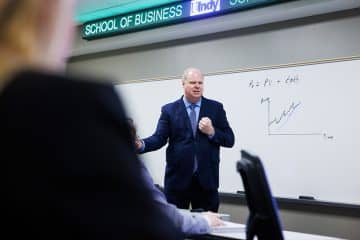What Are the Differences Between an MBA and an EMBA?
There’s no question that earning an MBA can do great things for your professional growth. Through an advanced business program, you will get a firm grasp on the managerial knowledge and skills that can serve you in any leadership position. As you comb through programs to take this next step in your career, you’ll find that there are many different options available. Some schools offer MBAs with certain specializations/concentrations, some have classes online, some have classes on campus, etc. That’s all straightforward enough, but you might get tripped up when you come across what’s called an Executive Master of Business Administration programs, or EMBA.
So what does “Executive” mean, and what’s the difference between a standard MBA and an EMBA?
The Basics
Above all, the main difference between an MBA and an EMBA is not in the course material, but rather in the students themselves. In fact, the content of the programs rarely differ; what separates the two are the delivery methods, timelines, and expectations.
Both full- and part-time MBA applicants are often looking for a significant career change as well as broad exposure to career-advancing experiences. An MBA will establish the skills for them to enter a management career. EMBA applicants, on the other hand, are typically well into their career and are looking to strengthen their repertoire within their current field. EMBA programs are designed with established working professionals in mind, assuming that applicants already have extensive business experience and will need to pursue their studies while holding a demanding position in their career.
Because the demographic of students in MBA programs differ so much from those pursing an EMBA, the two programs will naturally have very different schedules. The actual program’s material, however, is typically quite similar.
The Application Process
MBA programs expect applicants to have relatively little work experience. Since only about 1-5 years of experience are typically required, standardized test results carry a lot of weight in the application. It is common for schools to require a minimum GMAT score of 600 (700 in highly selective schools).
EMBA programs admit professionals with extensive work experience, usually 10-15 years’ worth. Enrolling students with an average age of 38, these programs do not require entrance exams and are more reliant on students’ real-world work in their careers.
The Format
As with all adult learning programs, the duration, teaching style, and class format can vary widely depending on the school. That said, MBA and EMBA programs have marked differences that are more conducive to the lifestyles of their respective demographics.
Students can pursue an MBA on either a full- or part-time basis. It traditionally takes two years to complete, though part-time programs can be stretched out to as long as three or four years in length. Some part-time programs are offered 100% online or through an online/on-campus hybrid model. Many full-time programs, on the other hand, have more immersive programming that takes place on campus. Students should therefore live near (or on!) campus for their in-person education.
On top of the core business education, MBA students at many schools can take elective courses to further concentrate their focus and specialize in a certain area of administration. This is the starkest contrast between the MBA and EMBA course options, as there are fewer chances to enroll in electives while in an EMBA program. The reduced elective options in an EMBA program are obvious when you understand how uniquely the classes are scheduled and taught.
EMBA programs are designed to fit around the busiest of schedules. EMBA students continue to work full time outside of their classes, so study is limited to evenings and weekends. Students tend to meet infrequently all year round, condensing their course material into intense bursts in order to minimize their distractions from work and family. Because their classes meet less often than their MBA counterparts, EMBA programs usually have long class sessions that compress coursework into fewer days.
The Cost
Paying for higher education is a concern for everyone, regardless of the school, and regardless of the degree. It is most common today for both MBA and EMBA students alike to pay for their own education, but that doesn’t mean they go it alone entirely. There are many ways to find the funds for your degree, including both federal aid as well as private loans and scholarships.
MBAs and EMBAs often come at different price points. At first glance, it seems obvious that an EMBA costs way more than an MBA, but there are many other factors to consider. Full-time MBA students, for instance, may have to pay extraneous fees associated with board or nearby housing, and the time they commit to school will restrict the amount of hours they can work for consistent wages.
Conversely, a student in a higher-priced EMBA program might have lower costs than expected through the common benefit of employer tuition assistance. Many employers know the significant value that higher education can bring to their employee, and they are willing to invest in the stronger leader that their employee will become! In some cases, a company might pay for the majority, if not all, of the costs of an EMBA.
The Point
Which degree is right for you? In the scheme of things, both an MBA and an EMBA hold the same value. What differs is the type of student that they cater to. Regardless of which Master’s of Business Administration you want to pursue, we’re here to help. Abound: MBA can get you in touch with schools that we can confirm are Accessible, Affordable, Accelerated, and Advanced. Take a look at the schools we trust and find the MBA or EMBA program that works for you.





